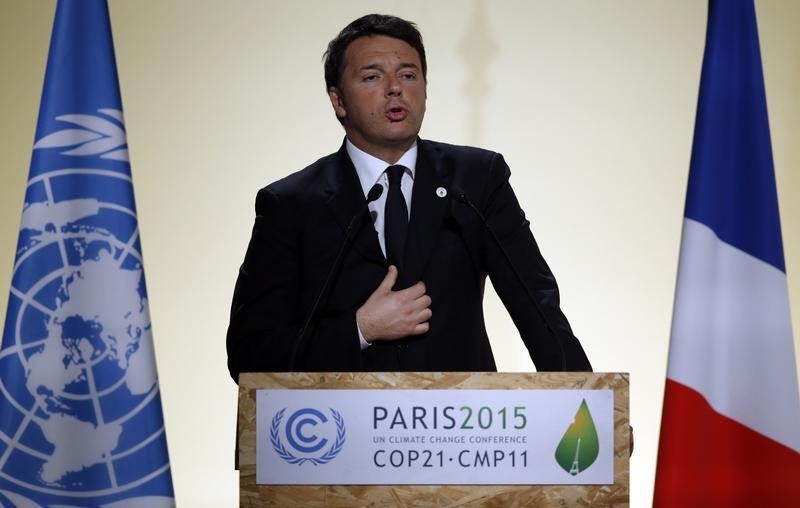By Francesco Guarascio
BRUSSELS (Reuters) - Italian Prime Minister Matteo Renzi may find himself the odd man out at a European Union summit this week where he is expected to raise questions over the EU's policies on issues from migration to banking, and possibly also about relations with Russia.
The regular year-end meeting of EU leaders on Thursday and Friday will focus mainly on Europe's migration crisis and the future of Britain's membership of the bloc.
Over the past few months, Rome has come under attack within the EU for not registering arriving migrants as EU rules require and allowing them to move on freely to other countries in the border-free Schengen area.
The 40-year-old Renzi is likely to raise the stakes by saying that the only way to deal with the worst migration crisis in Europe since World War Two is by fully sharing the burden between frontier countries in the south on the borders of Schengen and the richer north.
Banking regulation too has become a hot subject after Italy had to rescue four small lenders with a procedure that forced the banks' shareholders and junior bond holders to lose money.
A first bailout plan that may have had a lower impact on savers was trashed because of the opposition from the European Commission, the EU executive arm.
The suicide of a pensioner, who lost 110,000 euros in the rescue, made the issue even thornier, pushing opposition parties to call for the resignation of a top minister in Renzi's government.
At the summit Renzi may call for a swift deal on a European deposit guarantee scheme, a plan to share the losses of future banking crisis among the 19 euro zone countries, but opposed by Germany which fears its banks would pay disproportionately to protect other countries' depositors.
But Renzi's summit peers will also have to address an unexpected push from Italy for a review of EU economic sanctions against Russia at a time when an extension of them was widely assumed to be a done deal.
Renzi stressed on Wednesday that Italy would go along with an EU agreement now expected on Friday to renew the sanctions for six months.
But EU officials believe Renzi, whose country has significant economic ties with Russia that have been damaged by sanctions, wants to lay down a marker for a likely review of them in the new year.
Renzi who brings an air of youthful insouciance to eurosummitry, appears set on showing that Italy, a founder of the 28-nation bloc and its fourth-ranked economy, still counts for something in EU affairs after years of criticism from Brussels over its state finances and lax controls on incoming migrants.
Italian officials say the unusual tack by Italy at the EU, from a country which traditionally seeks compromise and keeps a low profile in Brussels, is a way of re-asserting itself within the bloc.

"We do not feel we are penalised as a country, but we need to work to rebuild a relation based on real trust," Sandro Gozi, Italy's top EU affairs official, told reporters.